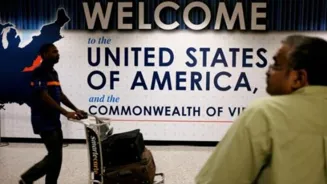What is the story about?
In a bid to curb migration, the US Department of Homeland Security (DHS) proposed new regulations to eliminate the current “duration of status” framework for certain non-immigrant categories. According to
ANI, the authorities will be replacing the status with fixed admission periods.
As per the report, the changes would apply to academic students (F), exchange visitors (J), and representatives of foreign media (I). The confirmation of the matter was also delivered by the notice of proposed rulemaking (NPRM) published by the US Immigration and Customs Enforcement (ICE).
In the notice, the DHS said that the current system does not provide immigration officers with “enough predetermined opportunities to directly verify that aliens are engaging only in authorised activities.” It is pertinent to note that the "duration of status"
permits visa holders to remain in the US indefinitely as long as they comply with the terms of their status.
If the proposal is implemented, it would require these nonimmigrants to apply for an extension of stay (EOS) with DHS if they wish to remain in the United States beyond their approved admission date. The proposed changes follow increasing concerns about visa oversight and national security, with DHS citing a high volume of admissions: over 1.6 million F-1 students, more than 500,000 J visa holders, and over 32,000 I visa holders in 2023 alone.
Some of the key changes proposed by the DHS are as follows:
According to the DHS notice, “greater oversight would deter fraud and abuse and strengthen the integrity of these nonimmigrant classifications.”
The DHS said that these changes would align these visa categories with other nonimmigrant classifications that already operate under fixed admission periods and would allow officials to “periodically and directly assess whether nonimmigrants are complying with the conditions of their classifications and US immigration laws.”
With inputs from agencies.
As per the report, the changes would apply to academic students (F), exchange visitors (J), and representatives of foreign media (I). The confirmation of the matter was also delivered by the notice of proposed rulemaking (NPRM) published by the US Immigration and Customs Enforcement (ICE).
In the notice, the DHS said that the current system does not provide immigration officers with “enough predetermined opportunities to directly verify that aliens are engaging only in authorised activities.” It is pertinent to note that the "duration of status"
What are the changes?
If the proposal is implemented, it would require these nonimmigrants to apply for an extension of stay (EOS) with DHS if they wish to remain in the United States beyond their approved admission date. The proposed changes follow increasing concerns about visa oversight and national security, with DHS citing a high volume of admissions: over 1.6 million F-1 students, more than 500,000 J visa holders, and over 32,000 I visa holders in 2023 alone.
Some of the key changes proposed by the DHS are as follows:
- A maximum four-year stay limit for F and J visa holders
- A reduced post-study grace period for F-1 students, from 60 days to 30 days.
- Restrictions on graduate-level F-1 students switching programs mid-course.
- A 240-day admission cap for I visa holders, with exceptions for certain cases involving China,
According to the DHS notice, “greater oversight would deter fraud and abuse and strengthen the integrity of these nonimmigrant classifications.”
The DHS said that these changes would align these visa categories with other nonimmigrant classifications that already operate under fixed admission periods and would allow officials to “periodically and directly assess whether nonimmigrants are complying with the conditions of their classifications and US immigration laws.”
With inputs from agencies.



















